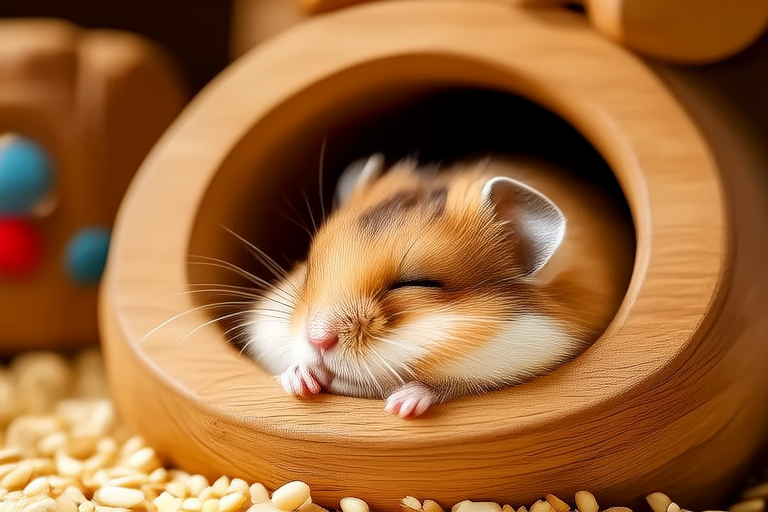From Playtime to Naptime: Daily Life Insights of a Golden Hamster Owner
Welcome to the delightful world of golden hamsters! These small, furry creatures are not only adorable but also fascinating pets that can bring joy and companionship into your home. With their unique characteristics and specific needs, owning a golden hamster is a rewarding experience that requires attention and care. This article will guide you through the daily life of a golden hamster owner, offering insights into playtime, dietary routines, and essential care. By the end, you’ll have all the information needed to provide a happy and healthy life for your little friend.
The Unique Characteristics and Needs of Golden Hamsters
Golden hamsters, native to Syria, are solitary animals that thrive best when kept alone. They are nocturnal, meaning they are most active during the night, which might surprise first-time owners. Their natural habitat includes burrowing and digging, so providing a stimulating environment is crucial. They are known for their gentle nature and can be quite affectionate towards their owners, especially when handled gently and frequently.
Hamsters have cheek pouches used for storing food, which can sometimes lead to overfilling and potential issues if not monitored. Their diet should consist of high-quality pellets, fresh vegetables, and limited fruits. It’s important to avoid feeding them foods that are toxic to hamsters, such as chocolate, citrus fruits, or avocado.
A Typical Day in the Life of a Hamster Owner
Morning Routines
Start your day by checking on your hamster. Gently remove any soiled bedding from the cage and replace it with fresh, clean bedding. This is also a good time to inspect the water bottle and ensure it’s functioning properly. Make sure the food bowl is filled with fresh, nutritious pellets and vegetables. A morning check-up ensures your hamster has everything it needs before the day begins.
Playtime Activities
Afternoon is the perfect time for playtime, even though hamsters are nocturnal. Provide a variety of toys that stimulate their natural instincts, such as tunnels, wheels, and chew sticks. Rotate these toys regularly to prevent boredom. Some hamsters enjoy exploring outside their cage under supervision. Use a secure carrier or a playpen with safe flooring to give them a change of scenery. Always supervise playtime to ensure your hamster remains safe.
Dietary Routines
Feeding your hamster a balanced diet is vital. Offer a mix of high-quality pellets, fresh vegetables, and occasional fruits. Avoid overfeeding, as hamsters tend to store excess food in their cheek pouches, which can lead to discomfort or blockages. Provide a constant supply of clean water. Check the water bottle daily to ensure it’s not leaking and that your hamster is drinking adequately.
Naptime and Nighttime Care
As evening approaches, prepare for naptime. Hamsters need about 8 to 10 hours of sleep per day. Ensure their sleeping area is quiet and undisturbed. At night, when your hamster is more active, engage in gentle play and interaction. This is also a great time to observe their behavior and check for any signs of illness or distress.
Setting Up a Stimulating Environment
Creating a stimulating environment for your hamster is key to their happiness and well-being. The cage should be spacious enough to allow for running, climbing, and burrowing. Add layers of bedding for comfort and nesting materials. Introduce various toys and accessories to keep your hamster mentally and physically engaged. Regularly clean the cage and replace bedding to maintain hygiene and prevent odors.
Maintaining Health and Wellness
Regular health checks are essential. Look for signs of illness, such as lethargy, loss of appetite, or changes in feces. Keep an eye on their weight and overall appearance. If you notice any unusual behavior or symptoms, consult a veterinarian specializing in small animals. Vaccinations are not necessary for hamsters, but routine check-ups can help catch potential health issues early.
Rewarding Aspects of Owning a Golden Hamster
Owning a golden hamster brings numerous rewards. Their playful and curious nature makes each day exciting. Watching them explore, run on their wheel, or simply interact with you can be incredibly heartwarming. Hamsters are relatively low-maintenance pets, making them ideal for busy lifestyles. Their presence can also teach responsibility and compassion to children, fostering a love for animals.
Advice for Prospective Owners
If you’re considering bringing a golden hamster into your home, there are a few things to keep in mind. First, ensure you have the time and resources to care for them properly. Research thoroughly and understand their specific needs. Be prepared for nocturnal habits and the occasional mess. Lastly, remember that while hamsters are affectionate, they require gentle handling and respect for their solitary nature.
In conclusion, owning a golden hamster is a rewarding experience that offers companionship and joy. By understanding their unique characteristics and needs, you can provide a loving and stimulating environment for your little friend. From playtime to naptime, every moment spent with your hamster is an opportunity to deepen your bond and ensure their happiness. Happy hamster ownership!
